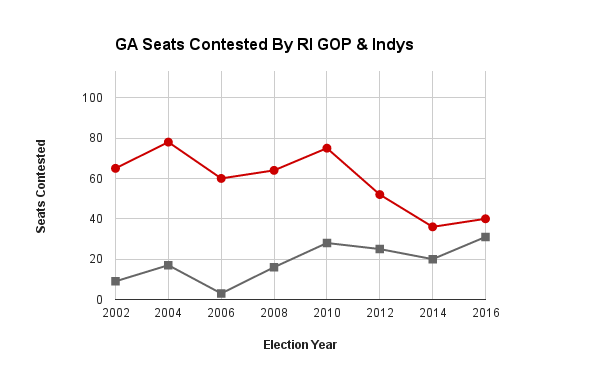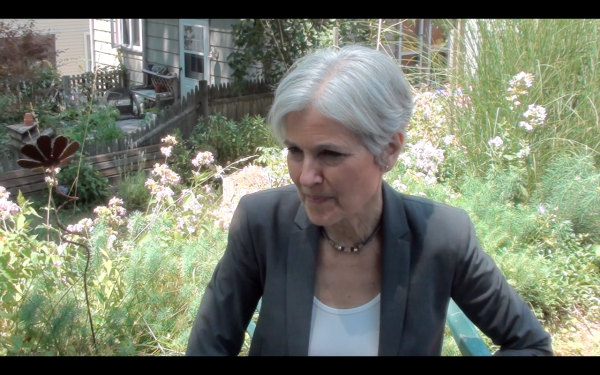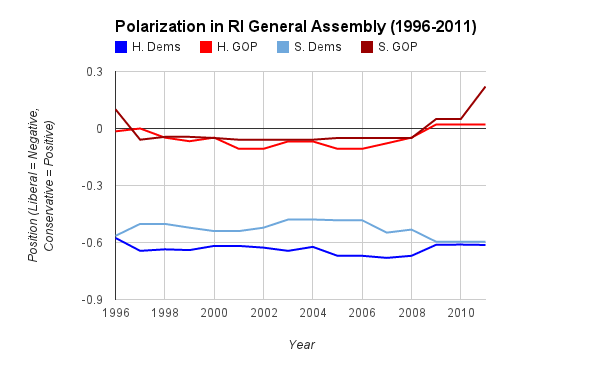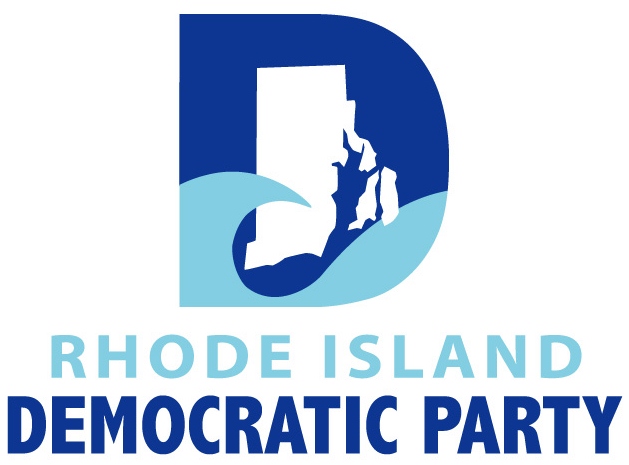The only issue is that the candidates haven’t materialized. Here’s the graph of seats (Republicans in red, independents in grey) contested by Republicans since legislative downsizing ahead of the 2002 elections:

This year, Republicans will contest 40 seats in the legislature. If they won all of them, they would barely break the Democratic supermajority in the Senate, and still fail to do so in the House. Keep in mind, 40 would be about twice as many districts as they have won, ever. There are only about 20 districts across the state that Republicans have ever won. Winning 20 districts would actually make this the most successful year the Republicans have ever had since the General Assembly reached its current size in 2002.*
Simply put, the Republican candidates necessary to make their party a functioning opposition haven’t materialized. And it’s noticeable to me that Republican recruitment issues have grown worse since 2010, when a Republican wave election empowered Republicans nationwide and gave them majorities in both chambers of the U.S. Congress.
The grey line is candidates running as Independents, and the point to notice here is that they have increased the number of seats contested over time. And Independents in Rhode Island often caucus with the Republican Party in the State House (e.g., Blake Filippi) or are already Republicans (e.g., perennial Providence candidate Luis Vargas who volunteered for the RI Republican Party). Not all, mind you, but many would’ve been Republicans.
Notably, these developments (the increasing difficulty of the Republicans to recruit candidates, and the increasing number of Independents) have happened pretty much independently of the master lever’s existence.
But these are just seats. What about the number of candidates? If Republicans have only ever been competitive in about 20 districts, then this could undercount candidates in safe Republican seats.
| Party | Seats Contested | Qualified Candidates |
|---|---|---|
| Democratic | 108 | 138 |
| Republican | 40 | 43 |
| Independent | 31 | 35 |
As you can see, Republicans did fairly well in distributing their candidates for seats; as did the Independents (more remarkable because no one is organizing them). Meanwhile, the Democrats have more than enough candidates to contest all 113 General Assembly seats, but didn’t contest five of them: House Districts 30 (Incumbent: Giarusso – R), 36 (Incumbent: Filippi – I), and 48 (Incumbent: Newberry – R) and Senate Districts 35 (Incumbent: Gee – R) and 38 (Incumbent: Algiere – R).
Democrats’ recruitment advantage continues unabated. In fact, just on the numbers, Democrats could split into three parties that could each match Republican recruitment abilities.
The problem was never going to be the master lever for Republicans. The problem remains (as it has been since 2006) their party’s toxicity to a state that overwhelmingly supports Democratic policies. And even one of the most liberal state Republican Parties can’t overcome that obstacle – especially with Donald Trump on the top of the ticket. At this point, I think Republican hopes for growing their caucus (or even keep it the same size) this election is that the commentary on RI Future here is true: Clinton really is so unpopular that liberals will stay home and they can pick up low-turnout seats. The problem is that the people who dislike Clinton tend to be Republicans, and the people who dislike her as much as Trump aren’t really that big, certain in their choice, or even likely to be Democratic partisans.
Now, am I going to say RI Republicans will be massacred this year? No. I do not have a great track record there. But looking at past presidential elections and RI GA results, I’m going to guess the Democrats should win 100 seats and Republicans should win 12 seats. In each off-year election, Democrats have picked up 96 or 95 seats, and in each presidential year election they’ve picked up 99-102 seats.
The big question for me is what effect Trump will have. RI Republican office-holders have fairly closely embraced their presidential nominee, and nominees can have an effect down the ballot even to state legislatures. Trump seems more of an anathema to the average RI voter than a generic Republican, so theoretically, he could do serious damage to what remains of the RI Republican Party since the Bush years caused the liberal Republican to go extinct.
* An earlier version of this post inadvertently implied that Republicans have never been successful in GA races, that’s obviously not the case.
]]> Because I grew up in Rhode Island, am below the age of 30, and am a liberal, a lot of my friends this election season have abandoned following Bernie Sanders into the Democratic Party (however briefly) and instead pledged their support to Jill Stein, the Green Party candidate for President.
Because I grew up in Rhode Island, am below the age of 30, and am a liberal, a lot of my friends this election season have abandoned following Bernie Sanders into the Democratic Party (however briefly) and instead pledged their support to Jill Stein, the Green Party candidate for President.
This strikes me as poorly thought-out. While I can understand that in Rhode Island, the majority of voters are likely to vote Democratic, and thus many feel that it’s not a risk to vote Green (and are likely right) this is a problem of a collective action like voting: we only know the outcome when we know the outcome. Polling can tell us a probability of how our votes will be divided, but often that information is erroneously reported. Everyone works blindly, in a sort of prisoner’s dilemma; if enough people vote a certain way, they could throw the election to a person who would would be even worse.
This has been a factor in U.S. Presidential elections for a long time. Starting in 1828, Henry Clay and John Crawford made the results of that election inconclusive, Martin Van Buren could’ve prevented Lewis Cass from becoming President in 1848, Millard Fillmore likely spoiled the election for John Fremont in 1856, in 1912 William H. Taft spoiled it for Teddy Roosevelt (or possibly vice versa), in 1968 George Wallace arguably did in Hubert Humphrey, just as Ross Perot might’ve done to George H. W. Bush in 1992, and in 2000 Ralph Nader helped make George W. Bush president.
All of these took place in specific circumstances. 1828 was a breakdown of the dominance of the Democratic-Republican Party, and the emergence of true political parties in the United States. 1848 saw the rise of an explicitly anti-slavery party with a former president at its head, whereas in 1856 the former president was leading a nativist party that sought to ignore the issue of slavery. Taft and Roosevelt were both the sitting and the previous president, striving against one another as the Progressive movement sought to move out from merely being a cross-party group. 1968 was the breakdown of the New Deal coalition and the “party switch” that transferred segregationist white southerners into the Republican Party. And 1992 and 2000 were eras of relative prosperity where the presidency simply wasn’t too important.
Majorly, the thing to notice is that except for recently, almost all of these featured establishment politicians making plays for power. Only Perot and Nader are exceptional in lacking political office on that list, and the impact of their parties have been negligible. Clay helped establish the Whigs soon after 1828, Van Buren’s Free Soilers joined the Whigs to become the Republican Party within a decade, Fillmore’s American Party was already on the decline in 1856 after having achieved control of the U.S. House, but was absorbed into the Republicans. The Progressive movement basically had all three major candidates in support of its goals in 1912. Wallace’s pro-segregation supporters have been dog-whistled to for the last fifty years until Donald Trump put down the whistle and starting yelling things at the top of his lungs.
Meanwhile, Perot and Nader’s efforts have come to naught. The Reform Party is spent, and 16 years later, the Green Party is as much of a joke as it’s ever been. Their efforts for the presidency are not turning points in American political history, but rather quixotic ends to otherwise fine careers.
Now, I’ve been highly focused on presidential elections, and I think this highlights the issue of third parties. In the way things are structured in most states, third parties simultaneously must contest the highest possible office. This constantly forces them into the position of spoiler for other candidates more likely to win, making voters resistant to casting their ballot for the third party. This Duverger’s law in action – a system like the United States’, with plurality voting and single-member districts, forces there to be mainly two parties.
What’s the current most successful third party in the United States? It’s not the Greens or the Libertarian Party. It’s the Vermont Progressive Party. The Progressives there have two things going for them: fusion balloting, which allows candidates to run as both a Progressive and a Democrat, and multi-member districts, which means there’s a level of proportionality in how many seats a party gets based on its vote in the districts. Also, there are fairly relaxed rules to establish a political party. It’s a highly local party that was mainly established to support Bernie Sanders as mayor of Burlington, VT; the party’s main power base continues to be located there.
The other major thing the Vermont Progressives have is that they don’t need to contest major offices. As a result, they can persist beyond being a personality-driven organization. And let’s face it, third parties are mostly vehicles for specific individuals’ megalomania.
Take Rhode Island. I have long said that the Moderate Party lacks an identity beyond being the party of Ken Block or Bob Healey. With the former abandoning it, and the latter deceased, it’s now got to find someone new to be its standard-bearer for governor. It’s forced into this position because RI’s ballot access laws require a political party to win more than 5% of the vote for governor or president every four years, depending on when you collected ballots.
This is intentional, and it prevents third parties from spending resources in more easily-winnable races, such as at the school committee level or town council. It means a third party has to exhaust a lot of manpower or cash on a big race it can’t win to achieve ballot access every four years, or else face being dissolved. So they lose, they might cost someone else the election, and drive potential supporters away. Meanwhile, they are unable to conduct meaningful candidate recruitment, unable to attract potential candidates because they appear frivolous, and unable to establish any sort of meaningful governing record.
This drives an incentive to simply be some individual’s ego trip. And that’s exactly what’s happening in the Green Party and its nominee Jill Stein.
You might think this is hypocritical to focus on Stein’s ego when this is an election of egos. But let’s be frank: Stein’s ego far outstrips her actual accomplishments. Her highest office to date is Lexington Town Meeting Representative. And yet, she says her aim is to win “at least a plurality” of votes in November (anything more than a plurality would be a majority). Her current Real Clear Politics polling average is 3.8%.
No other presidential candidate with ballot access to a potential majority of electoral votes is this delusional. Donald Trump actually won a major party’s nomination, despite his ego making him think lying about his success is the same as “sacrifice.” Gary Johnson actually has run a state as a governor – and won reelection. And there’s a strong case that Hilary Clinton is as egotistical as anyone, but then again, she’s earned it. We can definitely criticize her arrogance, but she actually has been U.S. senator and secretary of state. She actually has had to craft and shepherd policy that effected millions of people’s lives. And more importantly, she actually has a political organization that can support and help pass her agenda should she reach the White House. Trump has the latter, and Johnson has done the former, but Stein can’t claim either.
No third party will take the presidency this way. The only way so-called third parties have ever managed to do so is by stepping over the bodies of their predecessors. The next major party of the United States won’t be from the edges of the political system; it will follow Clay and Van Buren, and Lincoln – it will arise from the heart of the establishment, lead by a figures who were once partisans in some deceased major party.
There are, at least, political movements that understand that change happens through political power, not at its fringes. Say what you like about the Progressive Democrats and the Working Families Party – at least they are attempting to shift the dynamics locally of one of the parties, and with a greater potential for impact than all the Greens put together.
]]> Lost in the aftermath of the budget was this gem (start at around 2:54; for fun, pay attention to Reps. Shekarchi and Morin reactions) from last Friday’s House debate over Budget Article 1. In it, Rep. Karen MacBeth claims that the FBI temporarily seized control of her home computer for reasons unknown.
Lost in the aftermath of the budget was this gem (start at around 2:54; for fun, pay attention to Reps. Shekarchi and Morin reactions) from last Friday’s House debate over Budget Article 1. In it, Rep. Karen MacBeth claims that the FBI temporarily seized control of her home computer for reasons unknown.
Now, I’m not a seasoned law enforcement professional, but given a lot of ink has been spilled over the ability of government to monitor Internet activity without much oversight, it seemed suspicious that the FBI would notify someone if they were hacking a computer. It seems to me that if you’re looking for documentation of wrongdoing, you’d get a warrant or request it from a possibly cooperative source like MacBeth. And if you didn’t want MacBeth or anyone to know, you’d get permission to do it secretly.
So I did what I usually do in cases like this, I searched “the FBI has taken over my computer” online. And I found this little piece of malware (more specifically, ransomware) known as “Reveton” or “the Moneypak Virus” from a number of articles from one to two years ago. Basically, it’s something you accidentally download from either a bad website or email and then locks your computer until you pay. The ransomware poses as the FBI, or if you’re in another country, that nation’s police or cybersecurity force. The genuine FBI has been warning people about this virus for a while.
Now, the details of Rep. MacBeth’s encounter with someone claiming to be the FBI hacking her computer doesn’t quite match up with what’s described in the above links, and from her summation of the events, we don’t get a detailed picture of what happened. Perhaps it really was the FBI. Or perhaps, (and in my view, more likely) this was an iteration of the older piece of malware; since it’s shown to be pretty adaptable.
If it’s the latter, I hope the Speaker asks himself why he made her House Oversight Chair. Frankly, I’d look for a healthy level of skepticism on the part of the Oversight Committee Chair.
P.S. A number of articles note that this virus could be stopped by having up-to-date antivirus software. If you’re a cheapskate like me, there are plenty of free alternatives. And yes, Mac users, that means you too! You get viruses as well, so protect yourself before you wreck yourself.
]]> Of great concern last Thursday night for some members of the Rhode Island House of Representatives was the potential of there being something like 39 different minimum wage laws. Again and again, representatives warned of economic disaster if the City of Providence passed a law mandating $15 an hour for hotel workers; and so in response they took away the ability of all cities and towns to pass minimum wage ordinances. It was as naked a revocation of power as has ever been seen in Rhode Island.
Of great concern last Thursday night for some members of the Rhode Island House of Representatives was the potential of there being something like 39 different minimum wage laws. Again and again, representatives warned of economic disaster if the City of Providence passed a law mandating $15 an hour for hotel workers; and so in response they took away the ability of all cities and towns to pass minimum wage ordinances. It was as naked a revocation of power as has ever been seen in Rhode Island.
Some argued that there shouldn’t be different wages for different jobs. But the budget contained no action to close the tipped wage loophole in Rhode Island. In the minds of those voting for the article, it’s wrong to raise wages for a select few above the state minimum wage, but it’s perfectly fine to pay people less than the state minimum wage.
More to the point, in their repeated invocations of “39 different…” the state’s representatives continually argued against the very existence of the cities and towns that they supposedly represent. Why have “39 different” permitting processes? Why have “39 different” different zoning systems and approval processes? Why have “39 different” school systems (yes, I know in reality there are less)? The possibility of confusing contradictions between jurisdictions never seemed to bother the House of Representatives at any point prior to this moment. As far as I know, not a single candidate ran against the complex maze of towns and cities we have.
Indeed, why even bother having the charade of “39 different” governments, considering how detrimental that could be to business? That’s quite a lot of officials to lobby and donate to. Rhode Island could be far more competitive if they only had to donate to the leadership of, say, 113 people divided into two chambers. Although it might cause damage to Rhode Island’s lobbyist businesses if there was a sudden reduction in the number of government officials to wine and dine.
Now, in practice, there are a number of economically fine counties about the size of Rhode Island in terms of geography and population that have dozens of governments more than Rhode Island. It ultimately goes to show that it’s not the amount of governments that matter, but rather the quality of them. And the quality of Rhode Island’s state government is so low that should anyone seriously suggest moving to a city-state style of government, with the General Assembly in charge of everything, there’d probably be a mass revolt.
That thought should’ve given pause to lawmakers on Thursday night, and a week before that when Rep. Raymond Gallison added the provision to the budget. While the Assembly cries constantly about not wanting to meddle in the affairs of business, meddling in the affairs of its people appears entirely acceptable.
]]>So it’s fair to say I’ve seen a lot of silhouettes of Rhode Island. And my feedback is almost rote now. “Where’s Block Island?”
To be fair to many of those who send the silhouettes to me, Block Island isn’t nestled as close as the other islands. But it’s roughly 75% larger than Prudence Island (and about 12x more populated) and Prudence almost always appears in a Rhode Island silhouette – albeit, often with a new landbridge between it and Patience Island.
But what would this article be without examples? The most glaring examples tend to come from Rhode Island’s political community. Here’s the Rhode Island Democratic Party’s logo (which eliminates not just the typical biggies of Block Island and Prudence, but also Jamestown’s island home of Conanicut):
Here’s the late Anchor Rising logo:
And in case you missed it up at the top of the page, RI Future’s current logo:
Over time, I’ve gotten into an ongoing Twitter back-and-forth with @Blockislandinfo about their missing island, and it’s yielded gems like this one:
@SamGHoward left off another one. pic.twitter.com/YyBZXkhNWj
— Block Island Tourism (@Blockislandinfo) May 23, 2014
That’s from GrowSmart RI’s Power of Place summit, which was all about Rhode Island.
That said, I’ve seen some examples of including Block Island. For all of its faults as a logo, the RI Welcome Back Center‘s logo at least contains Block Island. Foolproof Brewery also uses an RI silhouette that includes Block Island to show where in the state it’s brewed:
And that example shows that you can include Block Island and still make a design that looks good, even if you’re restricted by having to make a circular one. And this is important, because there was once talk of secession on our small southern island. Maps matter, and Rhode Island is small enough already without ignoring bits of it – especially important tourism-generating bits.
P.S. Some other odd configurations of the Rhode Island silhouette I’ve seen: Rhode Island as a single landmass sans B.I., Rhode Island missing all islands (and thus missing the “Rhode Island” part of it), and Rhode Island including Bristol County, MA.
If you see any more examples of odd Rhode Island silhouettes, feel free to tweet me (@SamGHoward) or post them in the comments below.
]]>Rhode Island’s special distinction for “limited activity” lobbyists has created A gray area in the law prone to causing confusion or even unintentional noncompliance. Anyone who lobbies state government should be registered with the secretary of state’s office, regardless of how little he or she does so.
Article I, Section 21 of the Rhode Island State Constitution (emphasis added):
Section 21. Right to assembly — Redress of grievances — Freedom of speech. — The citizens have a right in a peaceable manner to assembly for their common good, and to apply to those invested with the powers of government, for redress of grievances, or for other purposes, by petition, address, or remonstrance. No law abridging the freedom of speech shall be enacted.
 Plenty of organizations make calls to action to legislators’ constituents, asking them to write or call or meet with their representatives to request action on a specific issue. By definition, that’s lobbying. Change.org has even made it as simple as simply putting your name, email, and address in a form and hitting “submit” – no more action is required from the person doing the lobbying. So, are these people supposed to register as lobbyists?
Plenty of organizations make calls to action to legislators’ constituents, asking them to write or call or meet with their representatives to request action on a specific issue. By definition, that’s lobbying. Change.org has even made it as simple as simply putting your name, email, and address in a form and hitting “submit” – no more action is required from the person doing the lobbying. So, are these people supposed to register as lobbyists?
To be fair to de Ramel, even the current Secretary of State’s “Am I a Lobbyist” page is pretty unclear on such people – which of the five exemptions do they fall under? Some will probably argue that there’s a precedent for dealing with those people, and in practice they’re never going to be effected by lobbying laws. But if such a grey area exists (in practice), that highlights the problems with the current system; and what de Ramel’s proposing.
The simpler and more elegant solution that I’ve heard proposed is to simply required state officials to keep lists of everyone they meet with or are contacted by and make those public. That would probably inconvenience officials to some extent (which is probably why such a proposal has zero chance of passing the legislature), but transparency is kind of inconvenient, isn’t it? And it’s probably a bit better than hunting down constituents for requesting their legislator vote this way or that on a gun control bill.
]]> Data shows us that Rhode Island has one of the least polarized legislatures in the country. It is governed by a centrist consensus that fails to please policy demanders on the wings. Yet those demands from the wings are essential to maintaining the consensus – politicians can portray themselves as fighting against so-called “special interests” from whichever side is useful.
Data shows us that Rhode Island has one of the least polarized legislatures in the country. It is governed by a centrist consensus that fails to please policy demanders on the wings. Yet those demands from the wings are essential to maintaining the consensus – politicians can portray themselves as fighting against so-called “special interests” from whichever side is useful.
The sudden ascent of Speaker Nicholas Mattiello shows us how dominant the Rhode Island consensus is; a Democratic speaker was elected with the majority support of the Republican caucus. Within the Democratic caucus, the opposition (equivalent to 16% of the vote) was equally split between the alternative candidate and abstention. Some of Mattiello’s erstwhile opponents even turned their coats and voted for him when it was apparent they could not win. Defeated opponent Rep. Blazejewski described the decision by saying that “…egos shouldn’t get in the way. We have to elect a new leadership team and move forward with all of the problems facing our state.”
And yet, despite saying his rise was a “sea change” in how the House was to be governed and calling for unity, Mattiello’s ascension fit previous patterns – a majority leader takes the speakership. Those who oppose him are cast into the wilderness, those who support him are rewarded with the spoils of victory. Perhaps that those sharing the spoils were marked with Rs as well as Ds was not so typical, but it’s been done before.
This is the consensus that governs Rhode Island politics and creates a government that swerves from right to left on fanciful whims. This is a consensus that either co-opts or isolates those who would oppose it. This is the consensus that creates a de facto one-party system and cripples Rhode Island’s government from taking more than a piecemeal and ineffective approach to change. Thus a “Rhode Map” is issued that addresses an imaginary problem rather than the real one, tax cuts are passed without an honest plan for how they’ll increase economic activity – or how the State will leverage their issuance, and minor electoral tweaks made that will fail to make a real impact on building a flourishing participatory democracy.
Somewhere along the way, I’ve read that a democracy with a single-party system isn’t really a democracy. While I leave it to others to debate whether Rhode Island is more oligarchy than democracy, I think the problem lies in the lack of an organized and disciplined opposition. Right now, Rhode Island’s government is similar to Britain’s in the early 19th century, dominated by factions who rapidly change allegiances based on their interests. Until a real opposition is constructed, I do not foresee much in the way of real change happening in Rhode Island.
The old, unsuccessful way to build an opposition has been to construct an alternate party. Robert Healey’s Cool Moose Party in the 90s has vanished and the Green Party and the Libertarian Party are unsuccessful in getting anywhere. Ken Block’s Moderate Party proved that with enough cash the media will listen, but the project of building a centrist party when the Republican Party already occupies a centrist position was really nothing more than a re-branding of the Republicans that proved to be a spoiler in the 2010 elections. Block has since succumbed to the reality that the Republican brand is still the better one than the Moderate brand.
And they are brands, symbols to differentiate one political organization from the other. The party organizations themselves are extraordinarily weak in Rhode Island. Does anyone truly believe that it matters very much whether a Bill Lynch, Ed Pacheco, or David Caprio “runs” the Democratic Party? Even less can be said for the impact of Ken McKays, Mark Zaccarias, or Mark Smileys on the direction of the Republican Party. Success in Rhode Island’s political environment depends on associating yourself with the Democratic brand, and these days it seems even House Republicans understand that.
The current state of Rhode Island’s political system has given rise to a network of organizations that generally support the candidates of the Democratic Party; a national brand that is extremely popular within the state. In place of the old machine method of politics, politicians must now build a coalition from the organizations within the network, gain support of activists, and successfully win voters. It is a significant boon to start with the popularity of the Democratic brand.
The old way of organizing an opposition was to start without the benefit brand. That’s like shooting yourself in the foot when you set out to win a marathon. A real opposition must take a page out of the past and form a “Loyal Opposition”. Just as there is a Democratic government, there must be a Democratic opposition to this government. This isn’t about egos, this is about solving our state’s problems by providing a genuine alternative from a genuine opposition.
That opposition must also come from the left. The Moderate project supposed an opposition could be built in the center, while ignoring that both Democrats and Republicans already occupy that space. From the broad support the Democratic Party enjoys, we know that its values are supported. The current consensus pays, at best, lip service to those values. There is simply more room for opposition at the Democratic left.
I’m not alone in realizing this. What Rhode Island needs is an independent political organization that will organize and rally an opposition – endorsing and supporting candidates in primaries and the general election. It fits in with current trends within the Left. It fits in with historical trends. The Working Families Party is using this strategy with a not inconsiderable amount of success.
This is a project which is the building of a substitute political party. It’s not a small order, it’s not a short-term thing, and it’s not a goal for the weak-willed. But for Rhode Island’s democracy and Democrats (both small d and big D) to flourish, it must be done.
]]> I take a pretty dim view of the way most of RI’s political commentators describe the situation at the General Assembly. On the left, you tend to hear the argument that conservatives within the Democrats have at least veto power over the Democratic agenda (and often it’s claimed conservatives control the GA) and these conservatives need to be overthrown. On the right, you’ll hear the argument that X number of years of ultra-liberal rule have doomed this state. Both of these narratives are simplistic and wrong.
I take a pretty dim view of the way most of RI’s political commentators describe the situation at the General Assembly. On the left, you tend to hear the argument that conservatives within the Democrats have at least veto power over the Democratic agenda (and often it’s claimed conservatives control the GA) and these conservatives need to be overthrown. On the right, you’ll hear the argument that X number of years of ultra-liberal rule have doomed this state. Both of these narratives are simplistic and wrong.
The problem is both of these arguments rely on nothing more than feelings. That’s mainly because we lack any sort of data at all when it comes to the political positioning of state legislatures.
Luckily for us, political science professors Boris Shor and Nolan McCarty have not only addressed this lack of data, but they’ve made it free for anyone with a spreadsheet program (which is literally anyone with a computer) to use. The caveat is that it only runs from 1993 to 2011, and not all of it is complete. It also measures the median legislator.
So where does the RI General Assembly fall in this data? Well, first draw a vertical number line where -2 is far left and 2 is far right. Keep that in mind when you examine the graph below:

The Republicans turned right from 2008 to 2011. This seems to be because the 2008 elections knocked out some Republicans, and the 2010 elections brought more right wing candidates into the fold. But the interesting part about this graph is that while the Senate Democrats went more left following 2008, the House Democrats turned right.
The other thing this graph points out is that among state legislatures, the Republican Party in the RI General Assembly is essentially dead center. Meanwhile the Democrats are center-left. Among other things, this points out the Moderate Party was always going to be a waste of time. RI’s general assembly isn’t being pulled between two poles of left and right, but between center and center-left.
Now, before everyone leaps to the comments to proclaim how stupid liberals are, let’s pause a moment and compare the caucuses to their counterparts in other states. We have two options here. We can use the most recent data that Shor and McCarty provide – which ranges from 2006 to 2011 depending on the state OR we can use 2006 across the board, which is where we have complete data for all legislatures. I’ll use both, and you can decide which you prefer. Note that Nebraska has no House of Representatives, and Pennsylvania’s most recent data is missing its Senate.
For the most recent data:
- RI House Dems are 31/49 most liberal (NV, GA, NC, PA, UT, TN, IN, SD, AK, WV, ND, MS, AL, LA, OK, KY, AR to right)
- RI House GOP are 46/49 most conservative (CT, MA, HI, NY to left)
- 3rd least polarized House (LA, KY less polarized)
- RI Senate Dems are 34/49 most liberal (MO, SC, TN, AL, TX, DE, KY, IN, SD, NE, MS, ND, WV, AR, LA, OK to right) PA: missing data
- RI Senate GOP are 45/49 most liberal (VT, CT, NJ, MA, NY to left) PA: missing data
- 4th least polarized Senate (LA, DE, WV less polarized)
For the 2006 data:
- RI House Dems 30/49 most liberal (KS, NV, NC, PA, GA, IN, WY, UT, TN, SC, AK, WV, SD, ND, AL, OK, LA, KY, MS, AR to right)
- RI House GOP 48/49 most conservative (NY to left)
- 3rd least polarized House (LA, KY less polarized)
- RI Senate Dems are 35/50 most liberal (SC, TN, KY, DE, SD, IN, MS, TX, ND, WV, AL, AR, LA, NE, OK to right)
- RI Senate GOP are 49/50 most conservative (NY to left)
- Least Polarized Senate
So what does that tell us? Well, that among Democratic state caucuses, RI Democrats sit in the right wing. Certainly, among Northeastern Democrats, RI Democrats are noticeably right wing. However, they’re still left of center. It’s because of the GA’s Republican caucuses that RI’s legislature (among all members) is one of the most centrist and least polarized legislatures in the country. I know I’m out on a limb here, but this is what the data’s demonstrating.
This is a state of affairs that disappoints both left and right and wins no accolades from anyone. Activists on both sides will call for their leaders to move towards the wings, and they’re likely to be successful in doing so.
Let’s jump track and look at the findings of Richard Wilkinson and Kate Pickett in The Spirit Level, which found that while Vermont and New Hampshire pursued two very different agendas (one on the left and the other on the right), they’ve arrived at roughly the same outcomes for their people. That’s ultimately what the General Assembly is judged on: the outcomes of the state. And I know people will dislike this, but some of it is simply beyond our control. Republicans in RI were lucky enough to preside over a period of industrialization, cheap labor, and prosperity from the mid 1800s to the early 1900s. Democrats in RI were lucky enough to preside over the broadening of that prosperity and the deepening of that industrialization, and unfortunate enough to preside over its collapse as well.
A lot of that wasn’t because of government policy, but because of events and technological advances no one would’ve foreseen. How a government creates or fosters broad prosperity is less important than that it does so. And it could very well be its own centrism that’s hamstringing the General Assembly from taking any action of importance for the economy.
]]> Rhode Island’s politics are often pretty messy. But with the 38 Studios bonds, they party lines are crystal-clear. There’s a pro-default party and there’s an anti-default party.
Rhode Island’s politics are often pretty messy. But with the 38 Studios bonds, they party lines are crystal-clear. There’s a pro-default party and there’s an anti-default party.
I’m am clearly on the anti-default party. I think it tends to be a more coherent; it’s solely about protecting Rhode Island’s credit rating. There’s a lot of bull about “protecting bondholders” and backing Wall Street, but I think the anti-default party couldn’t care less about protecting Wall Street wankers and are thinking that in the event we ever need to borrow again (which is a pretty common -and popular- request of voters on Election Day), we should do so with the best interest rates possible.
The pro-default party is less coherent. My favorite argument so far is the belief in the kinda-smart investor, as proposed by Justin Katz:
What if the state of Rhode Island went out to sell general obligation bonds and set its own terms for the debt? Maybe Moody’s and S&P would call the bonds junk, but that would simply be a lie. Backed by the full faith and credit of the state, with the express approval of the voters, the bonds would be as good and as safe a bet as if 38 Studios had never happened.
Are we to believe that the state couldn’t find enough investors who are sufficiently savvy to identify how badly rated the bonds are and to ignore the agencies?
Here’s the thing – the investors Katz has proposed are savvy enough to ignore the credit ratings of the bonds, yet not savvy enough to realize they stand to gain far more by getting the high-interest yield that junk bonds provide. Why buy these bonds when the interest could be much higher? I should walk my abuse of them for saying this, but the investors in the 38 Studios bonds were actually pretty smart. No matter what happens, they get their cash back. By the way, here’s the 10 companies who hold 90% of the bonds.
The left-wing pro-defaulters are more about refusing to dance to the whims of the credit ratings agencies and Wall Street – though I think it also assumes Katz’s magic investors as well. And while I think the impulse to defy Wall Street is admirable, we lack the economy, the population size, and the power to do so.
I’ve arrived at the same conclusion as Bob Plain, conservatives don’t actually care what happens in a default. But this applies to all of RI’s conservatives, Democrat and Republican. Either way a default plays out, it’s a win for them. If there are no substantial penalties, then they were right. If they’re wrong, then the inability of Rhode Island to effectively borrow achieves a long-standing goal for the “starve the beast” crowd. RI budgets couldn’t rely on any borrowing. A greater share of the budget going to service on interest payments means less money spent on social services – which means drastic cuts to programs and government payrolls.
Pro-defaulters are fond of saying the anti-defaulters are kowtowing to Wall Street, but the kind of budget RI would have to implement across the state should there be a default would undoubtedly make conservatives and the credit ratings agencies leap for joy. We’d probably see a budget that did more and more to favor the rich while cutting assistance to the poor. And we only need to look at Greece or Spain for the types of austerity Wall Street would like to see imposed on us.
However, pro- and anti-default are not the only type of political parties we have here in Rhode Island. That’s part of what makes 38 Studios so unique, it was a bipartisan screw-up. It was hatched by a Republican governor, a Republican businessman. It was enabled by a Democratic-led General Assembly. A Republican-led EDC signed off on it. And an independent administration failed to provide proper oversight.
The man who seems to have the cards in his hands right now is Speaker of the House Nicholas Mattiello. The question is how serious Mattiello is about his bipartisan budget. If Republicans follow House Minority leader Brian Newberry’s old advice of using 38 Studios against Democrats in 2014, they’ll have to vote against any budget containing service on the 38 Studios debt. Otherwise, they’ll undercut the argument that Democrats’ responsibility for 38 Studios has led to these straits. Right now they have a pretty decent narrative of “Democrats are in charge right now, so 38 Studios belongs to the Democrats.” They vote for service, they lose the ability to say that.
Mattiello (and Newberry) also has to realize that 38 Studios is a really good argument against incumbents; especially any incumbent who voted for giving the EDC the money it used for the 38 Studios deal. At this point, incumbents have already weathered one campaign with 38 Studios looming over their heads, but a default would really be bad. The status quo of payment for 38 Studios is painful for the state, but bearable. Default would be a massive blow to Rhode Island. It might spur a large-scale primary challenge to Democratic candidates, and rally independent and Republican candidates for the general election.
Since even with that, it’s likely Democrats will hang on to power, implementing a Wall Street-spurred austerity budget would shift more momentum to the Republicans. Regardless of the economic policies of the opposition party, voters tend to vote them in. I think a best-case scenario for Republicans would be ending the veto-proof majority of Democrats; given the strong partisan preference of RI voters for Democrats and the RI Republican Party’s own ineffectiveness. But with a Republican governor, that might well be enough to implement their policy preferences, especially if bolstered by support from the conservative faction of Democrats.
So defaulting on 38 Studios isn’t just bad policy for the state; for the Democratic Party it’s also bad politics. I’d hope the Democrats realize this, and take their lumps from 38 Studios.
]]> Let me ad some very insightful commentary on the whole 38 Studios saga: it sucks.
Let me ad some very insightful commentary on the whole 38 Studios saga: it sucks.
It sucks that much of the legislature feels they were conned into providing the cash for the deal. It sucks that Don Carcieri would recruit Schilling to bring his company here. It sucks that anyone in the then-EDC would believe it was a worthwhile deal. It sucks that we’d invest so much money in a long-shot product. It sucks that 38 Studios collapsed, mainly due to sucky management. It sucks that there was little oversight from the state on 38 Studios, despite being a major investor. It sucks that we’re repaying the investors who were already insured in case of 38 Studios’ failure. It sucks that the state used a “moral obligation” bond rather than a “general obligation” bond to provide the money, and to circumvent voters. It sucks that all of Rhode Island’s credit is being threatened by ratings agencies if the General Assembly chooses to default on the repayment. It sucks that the ratings agencies are ignoring the law that’s very clear that we don’t have to repay.
But with all that out of the way, let me tell you that it doesn’t matter how much it sucks. What matters is that it’s happened. Commentators and politicians can cry and moan about the unreasonableness of this all; about how the ratings agencies are being unnecessarily punitive, about how the bond yields took into account the chance of default, about how the investors will get all their money back through insurance, etc., etc. All of that is crying over spilt milk. Now it’s up to us to act like adults and clean it up.
In the complaints against repayment, you can see a lot of how people wish things were. Unfortunately, Rhode Island doesn’t exist in a land of make believe. It exists in the here and now. At the end of the day S&P, Moody’s, and Fitch (the big three credit ratings agencies) don’t play by the rules Rhode Island sets. These are the same agencies that were vital in enabling the existence of toxic assets that fueled the Great Recession and got away scott free. These are agencies that determine the borrowing ability of sovereign nations. Rhode Island, which lacks many of the tools sovereign nations have to blunt the damage from traumatic downgrades of our bonds, cannot go up against them and win.
Were we perhaps the state of New York, and could make life miserable for the ratings agencies, I would be more bullish about our chances of taking them on. If RI was the United States of America, which is impervious to ratings agencies at the moment, I would say go ahead and ignore them.
But we’re not. The very same people calling for us to default are the same people who go around decrying our flaws. They’re the ones ignoring that the ratings agencies can make or break us. It’s awful that we have to kowtow to the whims of these idiots, and the idiot investors who put money into the 38 Studios bonds. But these are the idiots that set the rules for Rhode Island, not the other way around.
To those of you looking to right this injury, I say “forget it, Rhode Island. It’s Wall Street.” The best we can do is bow to circumstance, lick our wounds, and ensure that this can never, ever, happen again.
]]>


